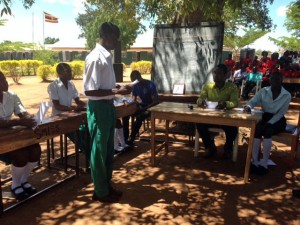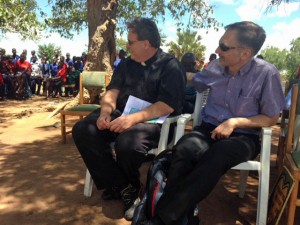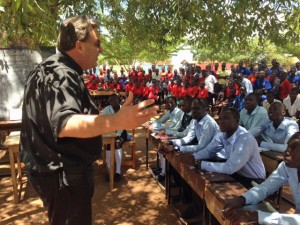Monday, April 20
Morning comes early after a wonderful, but long, Sunday. We’re heading back to Kampala today, but before we leave we have two important pieces of business at the school: a student debate on alcohol abuse and the dedication of a new “hostel” or dormitory for the girls.
The debate is first up. I have mentioned before that Ugandans are very ceremonious, and today is no exception. A great deal of care is taken bringing desks outside for the teams, setting them up carefully under the fig tree, and positioning a blackboard with the team rosters, the names of the timer and the judge, and the simple proposition: Alcohol should be abolished.
The teams, immaculately dressed in their best school uniforms (reserved for special occasions) take up their positions, with the entire school standing in rows around them, and a special seating area for “our visitors” as we are always called. In addition to me, Mark, and Jay, we include three American friends of our CEO in the US: Erin, Valerie and her daughter Molly. The judge announces the ground rules, the timer rings the bell, and they’re off!
The general atmosphere feels (not surprisingly) like a British courtroom. The kids clearly relish the formality and the chance to show off a higher level of English. The proposer addresses his argument to “Distinguished faculty, honored visitors, honorable judge, respected timekeeper, my fellow students, and the world at large.” Which pretty much covers it, I think. There are howls of appreciative laughter.
The case for abolition is fairly straightforward: alcohol weakens the body, kills the brain, destroys the family, undermines society, and is in all other ways vile, disgusting, and reprehensible. The proposers, however, seem to lack an enthusiasm for their subject and make the mistake of assuming the audience is on their side, as if the case were self-evident.
The opposition is of a different mettle. They are led by a fiery young woman about five feet tall, who goes on the attack right out of the starting gate. She is articulate, forceful, and superbly controlled; her English is flawless. She argues that to give the government power to abolish anything so commonly used, is an invitation to despotism. She points to the deep cultural roots of alcohol use in Teso, notes its benfits as a “socializing instrument” whereby “people who otherwise may not even like each other find their opinions changing, to the point that some of them even get married.” She disputes the dark view of the proposers, suggesting that alcohol in limited quantities has health benefits, that its use is a matter of individual choice, and the government in any case should keep its nose out of people’s business. It’s about the best libertarian argument I have heard on any subject.
The debate is interrupted by a point of order raised by the opposition: “Honorable judge, I wish to point out that a member of the other team has crossed her legs. I do not think this is a dignified position for one engaging in a debate!” A storm of laughter. Crossing one’s legs is indeed an offense against social etiquette in Uganda (though Westerners are almost always given a pass) and the offender is sternly corrected by the judge.The arguments proceed, and at the end, the guests are invited to say something.
Jay goes first. In a booming voice he tells them “I am an alcoholic!” People here are not used to the public admission that is basic to the method of AA, and this really gets everybody’s attention. After a brief and devastating description of the harm he has known, he calls everyone “not to even start” lest they “cause a brother or sister to stumble and fall.” Many nods, followed by a loud and respectful applause.
I weigh in with an acknowledgment of the problems caused by legal abolition (I talk a little about Prohibition in this country, which actually exacerbated alcohol abuse), but then speak of the responsibility of individual choice. The timekeeper rings the bell on me, so I just take it away from him (Hey: I’m the bishop!), which generates whoops and cheers from the audience. I ask them to be especially careful of the little 100cc “sachets” of hard liquor now available everywhere and wind up with a couple of examples of “stinking thinking” from our friends in the ajono group just down the road, concluding “if you don’t want your brain to work like that, don’t even start.” Dr. Guy gives a similar assessment to Jay’s, but focuses on the physiological effects– the slow degrading of the body caused by prolonged and excessive alcohol use, but also the spiritual effects of anger and hopelessness, teaching science and faith at the same time. All this takes less ten minutes. The judge, a biology teacher, prefaces his verdict with a biology lesson on alcohol in the body, and announces his decision: the audience must decide for themselves and must live with their decision! Solomonic, I think.
We move over to the new girls’ hostel, where Solomon announces that Valerie will fund the construction of a third dormitory next to the existing two. The girls erupt in a long traditional ululating cheer. This gift, about $4,000US gives huge added security to our young women. At present Pilgrim rents quarters outside the school fence, across the road. The buildings have security guards, and our matron, who is adored by the girls, keeps careful watch, but the risk is simply unacceptable. I think, three down and one to go. If we can build one more, we will have all of our most vulnerable kids within the perimeter.
The rest of the day is spent in the journey to Kampala. We make a couple of tourist stops: the ancient rock paintings at Nyero, the coffee co-operative warehouse and roasting plant at Mbale. Our speedy journey slows to a crawl on the outskirts of Kampala, but Solomon does the back-road thing again, and we get to the hotel by 11:30.
Tomorrow: you guessed it. Meetings.



